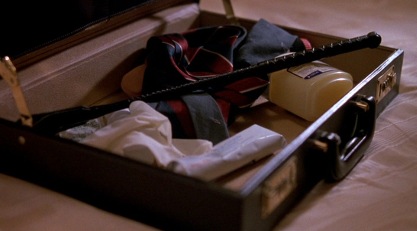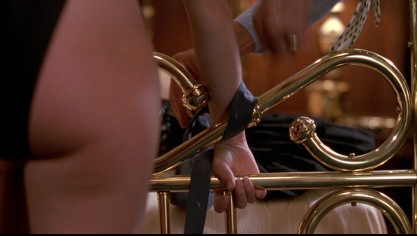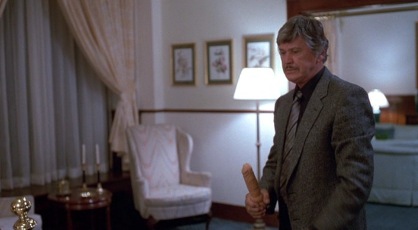Not all of the works I plan on exploring in The Celluloid Dungeon will have BDSM as a primary or even secondary theme. Some will have BDSM in a single scene or even a single moment.
Kinjite: Forbidden Subjects, a 1989 crime thriller starring Charles Bronson, is not a good film, by most standards. It’s mainly about an older racist cop, Lt. Crowe (Bronson), harassing and brutalizing non-white people in Los Angeles in pursuit of an exploitative pimp, Duke. That story is awkwardly spliced with another story about a Japanese salaryman, Hada, who moves with his wife and two daughters to Los Angeles. Hada’s elder daughter, Fumiko, somewhere in her early teens, is kidnapped, raped multiple times (offscreen, thankfully) and pimped out, before Crowe rescues her.
The opening sequence shows Duke dropping off Deedee (a pre-Baywatch Nicole Eggert) at a fancy hotel for a session. We get quick glimpses of a briefcase containing a riding crop, and a woman in lingerie being tied to a bed.


The props of sadomasochism (a riding crop, bondage, a dildo) are used as shorthand to indicate that this is a bad, sick man doing bad, sick things. He is Other, and fully deserving when Crowe breaks in, beats him up and, when he refuses to testify against Duke, gets thrown face-down on a bed and the aforementioned dildo shoved up his ass. Thankfully, we don’t see this in detail, just hear the screams from outside.

In a later scene, Crowe kidnaps Duke at gunpoint, and forces him to swallow an expensive watch. He says, “I’d shove this up your ass, but I don’t want to get my hands dirty.” After setting Duke’s car on fire, Crowe goes home to his wife, washes his hands, and says he doesn’t feel like dinner tonight.
Crowe repeatedly refers to the teenage girls Duke controls as “little girls”, or even “babies”. In his personal life, he’s on edge about his own teenage daughter’s sexuality. What’s driving this narrative is the anxiety/rage about the sexuality of young white women (almost always blonde) and the sexuality of non-white men. This rage justifies Crowe’s many violations of the law and police regulations, not to mention various racist diatribes.
This formula is disrupted when Fumiko is kidnapped by Duke, and Crowe is assigned to the case. Crowe can’t help empathizing when he sees Hada dissolve into tears over his missing daughter.
Kinjite raises a lot of questions about race, sexuality and culture, but it doesn’t have the intellect or the interest to answer them. They’re an excuse for a lot of action and violence, mostly directed at non-white men.
The final scene of Kinjite is Crowe delivering Duke to his federal prison cell block, where he will be repeatedly assaulted and raped by other, bigger inmates. “That’s justice,” Crowe says, satisfied. Crowe doesn’t even bother to hide the pleasure he takes when he hears Duke’s screams of anguish.
Sadism is often a subtext of action movies, but Kinjite goes to the next level of vicarious pleasure in Crowe’s treatment of non-white men. Sexual deviance is punished with more sexual deviance.



